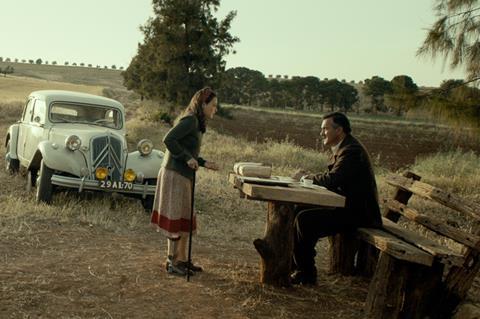SPONSORED BY JOSHUA JASON PUBLIC RELATIONS
9 DECEMBER 2021
In an interview with Screen for our FYC Screening Series, Djaâfar Gacem, the Algerian director of Helipolis, talks how he negotiated the leap from making TV soap operas to directing a coruscating account of France’s involvement in ethnic cleansing in Algeria at the end of World War 2.
In an interview with Screen for our FYC Screening Series, Djaâfar Gacem, the Algerian director of Helipolis, talks how he negotiated the leap from making TV soap operas to directing a coruscating account of France’s involvement in ethnic cleansing in Algeria at the end of World War 2.
Heliopolis is now the country’s entry to the best international film Oscar.
Watch the interview , which was hosted by Stuart Kemp.
Gacem acknowledges that making a film that deals with French-led genocide of Muslims in the years following the end of WW2 – actions that would fuel Algeria’s push for independence from its colonial mistress – is a big change from his burgeoning career as an established director and producer of popular drama series in Algeria.
But it was a story Gacem was determined to tell. Heliopolis is set in the Algerian village of the same name and centres around a family living between Muslim and Western values, colonial rule and the dream of seeing them play an important part in the “French Algeria”. When WW2 breaks out, this delicate balance gives way to a new vision of a more complicated Algeria.

SOURCE: HEWES PICTURES
‘HELIOPOLIS’
“For me Heliopolis was like being in school,” the filmmaker explains. “I learned a lot while making it. The plan was to make sure each scene in the film tells a story.”
He faced a series of challenges and obstacles during the production process. The budget of was tight and stretching it was a constant challenge. “There aren’t many sets in Algeria. We had to build reconstructions of colonial architecture. When it came to finding the military aspects of the film, I had access to two jeeps and planes but they were from the 60s so I needed to cheat a little,” he smiles.
Gacem initially thought casting the French characters would be hard. “I was afraid French actors would not want to be part of the film knowing what it is about,” Gacem says. “But when I was doing the casting there were many who wanted to participate and were enthusiastic. It’s a part of history that they didn’t know about and once they did they were sensitive to the topic and willing to play a part.”
The title Heliopolis comes from the name of a small village where thousands of Algerians were massacred then incinerated in lime kilns. “During the film I wanted to be neutral, I didn’t want the film to be a judgement. The reality was much more violent than the fiction I showed in this film. I wanted the western audiences to know this and accept it without twisting the knife.”
Gacem’s feature has been selected for a second time to represent Algeria, after it was submitted but then withdrawn by the Algerian Oscar committee last year, due to the Covid-19 pandemic preventing it from screening.
The title was part of Screen’s 2021-22 FYC Awards Screening programme.
Watch the interview , which was hosted by Stuart Kemp.
Gacem acknowledges that making a film that deals with French-led genocide of Muslims in the years following the end of WW2 – actions that would fuel Algeria’s push for independence from its colonial mistress – is a big change from his burgeoning career as an established director and producer of popular drama series in Algeria.
But it was a story Gacem was determined to tell. Heliopolis is set in the Algerian village of the same name and centres around a family living between Muslim and Western values, colonial rule and the dream of seeing them play an important part in the “French Algeria”. When WW2 breaks out, this delicate balance gives way to a new vision of a more complicated Algeria.

SOURCE: HEWES PICTURES
‘HELIOPOLIS’
“For me Heliopolis was like being in school,” the filmmaker explains. “I learned a lot while making it. The plan was to make sure each scene in the film tells a story.”
He faced a series of challenges and obstacles during the production process. The budget of was tight and stretching it was a constant challenge. “There aren’t many sets in Algeria. We had to build reconstructions of colonial architecture. When it came to finding the military aspects of the film, I had access to two jeeps and planes but they were from the 60s so I needed to cheat a little,” he smiles.
Gacem initially thought casting the French characters would be hard. “I was afraid French actors would not want to be part of the film knowing what it is about,” Gacem says. “But when I was doing the casting there were many who wanted to participate and were enthusiastic. It’s a part of history that they didn’t know about and once they did they were sensitive to the topic and willing to play a part.”
The title Heliopolis comes from the name of a small village where thousands of Algerians were massacred then incinerated in lime kilns. “During the film I wanted to be neutral, I didn’t want the film to be a judgement. The reality was much more violent than the fiction I showed in this film. I wanted the western audiences to know this and accept it without twisting the knife.”
Gacem’s feature has been selected for a second time to represent Algeria, after it was submitted but then withdrawn by the Algerian Oscar committee last year, due to the Covid-19 pandemic preventing it from screening.
The title was part of Screen’s 2021-22 FYC Awards Screening programme.
No comments:
Post a Comment